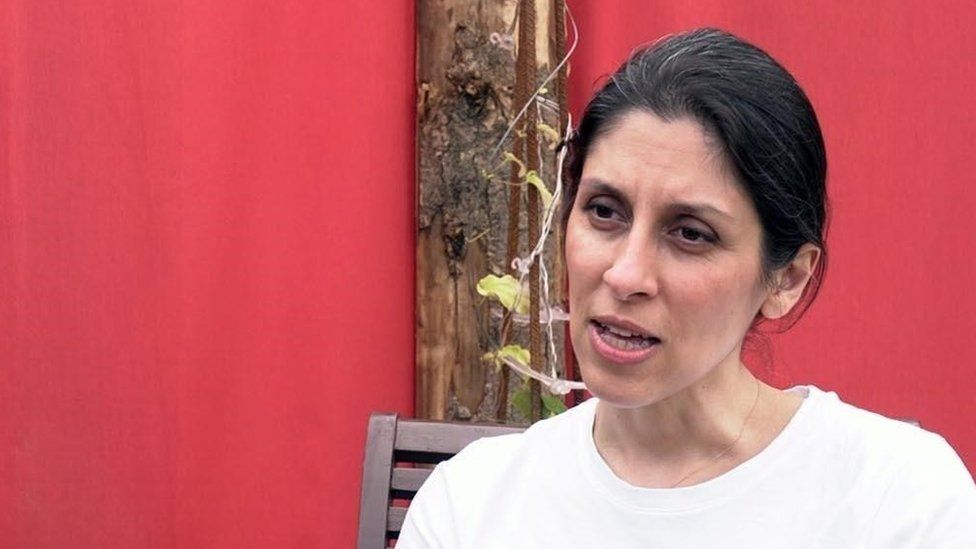Nazanin Zaghari-Ratcliffe: 'Readjusting to UK life was hard'
- Published

Nazanin Zaghari-Ratcliffe has said readjusting to life in the UK after six years in an Iranian jail had been slower than she had expected.
The British-Iranian national said protests and civil unrest in Iran since her release had kept her story "fresh on a daily basis".
"I resonated very much with what they have gone through," she said.
Ms Zaghari-Ratcliffe was arrested in Iran in 2016 on spying charges, which she denied.
She was released in March 2022 and returned to the UK following a sustained campaign.
Ms Zaghari-Ratcliffe made the comments on Friday at Glastonbury Festival, where she was giving a talk about Iranian women's rights.
Asked what it has been like readjusting to life in the UK, she said: "A lot slower than what I thought it would be.
"Just because early on when I was released, the uprising in Iran happened... since then I went through stories of many other people who were arrested, and then their stories came out."
She discussed the impact of seeing unrest which centred on the death of 22-year-old Mahsa Amini in September while in police custody for wearing her hijab too loosely.
"My story was all of a sudden so fresh on a daily basis and I couldn't get myself out of it - it was very hard," she told the audience.
"So I think settling down was a lot more complicated and difficult than what I was expecting because of what is happening.
"But, you know, I can't complain. I'm free and I'm out, whereas many of my friends are still in prison."
During the talk, she said the first names of the friends she was still campaigning to free: Nilufar, Sepideh, Mahvash, Fariba, Morad, Siamak, Emaad and Nargess.
Ms Zaghari-Ratcliffe, from West Hampstead in London, said she felt the continued unrest in Iran was no longer getting the attention it deserved.
"I think when this whole uprising happened back in September 2022, there was a lot of momentum, but then, of course, the world moves on," she said.
'Head-in-the-sand'
Her husband Richard Ratcliffe also commented on a damning report by the Foreign Affairs Committee on the Foreign Office's handling of hostage diplomacy.
It highlighted examples of "ministerial clumsiness" and "hurtful comments" in its communication with families.
Mr Ratcliffe described it as an important report.
"At the moment, cases like Nazanin's are reasonably rare... but they're growing, and that growth is something that the government is not really dealing with," he said.
"The head-in-the-sand 'let's hope we keep this at a low level' [approach] and manage it like you would with a really rare illness - it doesn't work.
"There are a number of countries who are taking hostages, there aren't many that make the media, there aren't many that the government will acknowledge as hostages or even acknowledge as arbitrarily detained.
"We'll await to see whether the government says 'yes, hands up, we need to get better' or whether what we get is a 'we'll carry on what we're currently doing but we'll tweak around the edges'.
"I've had both in my time... so let's see what comes."
The Foreign Office said: "The best interests of British national detainees is at the heart of our consular work and we support and work with their families wherever we can."
Follow BBC London on Facebook, Twitter and Instagram. Send your story ideas to hellobbclondon@bbc.co.uk
- Published13 May 2022
- Published23 May 2022